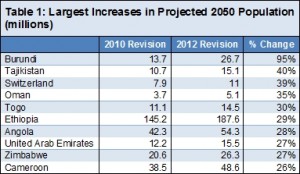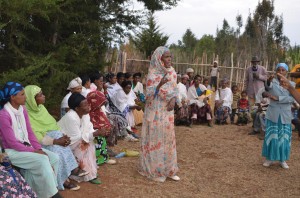Population Numbers: Addressing Family Planning for the Sake of Our World
Jul 10th, 2013 | By admin | Category: Family PlanningBy Suzanne York, www.howmany.org.
Here we are halfway through the year 2013 and it’s time for another World Population Day, officially recognized on July 11th. This United Nations-designated day is meant to raise awareness on all facets of human population growth. Given that the world is at 7.2 billion and counting, this is truly a day to stop and think about the needs of people and the planet.
The focus should be on more than numbers, of course. Providing a decent quality of life for all women and men, boys and girls, and maintaining healthy and vibrant ecosystems should be the overarching goal. Yet it’s hard to ignore the numbers. The UN recently revised its population projections: by 2050, the mid-range prediction is 9.6 billion people, and by 2100, 10.9 billion. These figures are up from the last UN projections of just two years ago.
Robert Engelman of the Worldwatch Institute called this increase in population a failure of family planning. Worldwide, 222 million women want to plan their families and space their children, but they do not have access to contraception. The need is greatest in Sub-Saharan Africa, where most population growth will occur. Fertility rates have been higher than expected in most of this region, which is cause for concern. Rising population around the world perpetuates poverty, gender inequality, environmental problems, joblessness, food insecurity, and even destabilizes regions. Experts have been noting that Egypt’s increasing population is exacerbating its political turmoil.Stabilizing global population growth will improve lives and make it easier to grapple with all the serious issues confronting our society – climate change, environmental degradation, poverty and inequality, food security, and resource scarcity, especially of water. Providing voluntary family planning services will ease the burden on women, many of whom want simply to improve their lives and that of their families. Investing in and empowering women and girls makes sense.
The good news is that we know what we need to do to reach a sustainable population, and have the tools and capability to do it. It’s just finding the will to implement the solutions. It may not be easy, but it’s possible, and we have to do it, for the sake of current and future generations. Cultures and beliefs can and do change, and these days change can come awfully fast.
UN Secretary-General Ban Ki-moon saidlast month that “Population is not a matter of numbers. It is all about people – the choices they make and the choices they are able to make.” He noted that “We must empower individuals. We must protect their freedom, ability and right to make informed decisions. This will enable people to fulfill their potential. And that will advance whole societies.”The U.S. and developed world, which have unsustainably high levels of consumption, should be addressing the needs of poorer countries and heed Ban Ki-moon’s call to help advance societies. Wealthier countries should be investing more in healthcare, education, and creating sustainable livelihoods for people around the world.
Healthy families and a healthy planet benefits us all, no matter where we live. On this World Population Day, let’s put human and planetary well-being at the top of the agenda.
Suzanne York is a senior writer with the Institute for Population Studies.


